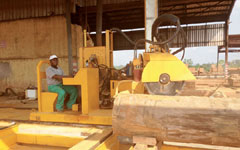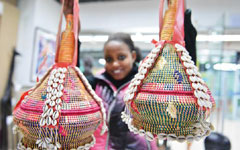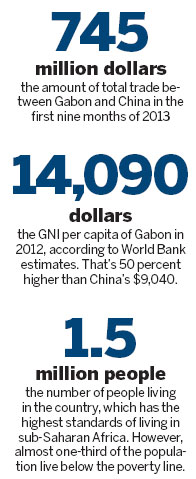"We would welcome Chinese investors and will do our best to facilitate the process. The center will be an agricultural school teaching stock farming, poultry and crop cultivation."
"Gabon is not self-sufficient in agriculture. Every year we import food worth 300 billion Central African Francs ($630 million). So our domestic demand is very big.
|
 |
 |
The minister sees a similar role for the Chinese in agriculture as they have demonstrated in infrastructure construction in Gabon over the past decade or more.
"We need help from foreign investors, especially Chinese investors. China has done very well in the construction sector here and I am sure it can do as well in agriculture," he says.
"We have so much arable land and we hope private Chinese investors can lease the land and develop it into various forms related to agriculture."
One company that has already played a significant role in this area is Sino-Gabon Fisheries Co. The Dalian-based company came to the country in the late-1980s and now fishes the warm waters along the country's 800-kilometer coastline which straddles the equator.
It operates 10 trawlers and with another Chinese company commands some 80 percent of Gabon's entire fish production.
 Some 90 percent of the catch, which includes staples such as red snapper, is sold in the local markets and is often on the restaurant tables the day it is brought back to harbor. The fish sold back to China tends to be cuttlefish and hairtail, neither of which is popular locally.
Some 90 percent of the catch, which includes staples such as red snapper, is sold in the local markets and is often on the restaurant tables the day it is brought back to harbor. The fish sold back to China tends to be cuttlefish and hairtail, neither of which is popular locally.
Lin Wei, the company's 51-year-old director-general and veteran of the industry, having worked in Guinea and Argentina before Gabon, says it is now becoming increasingly difficult to operate in the country.
He says it has become problematic to obtain trawler operator licenses and believes the government is too eager to listen to US and French advisers who are keen to use environmental concerns about overfishing against the Chinese.
"This is the trade-off of the business opportunities here and we have to adjust to it. On the one hand we have to abide by the laws of the country, but on the other we need to diversify the business and see opportunities in other areas such as aquaculture," he says.
Agriculture minister Bekale says the Gabon government is concerned about protecting the country's fishing waters.
It entered into a three-year strategic partnership with the European Union last year, called Blue Gabon, which will give Europeans access to the country's fishing waters in return for 450,000 euros ($619,512) being invested in the local fishing industry.
"Fishing is a very important industry in Gabon. The Blue Gabon partnership will help us better manage our fishing resources and deal with the problem of illegal fishing," he says.
"Chinese and Russian companies have taken a majority of Gabon's fishery resources. One thing is clear. If a company wants to enter our boundaries, it has to abide by our laws and carry out legal fishing."
|
 |
 |
